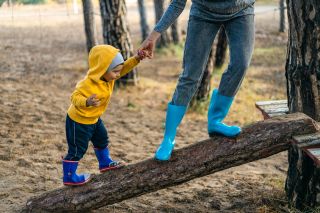Child Development
Why You Can't Remember Your Early Childhood
Memory may require language, and a sense of self.
Updated December 2, 2023 Reviewed by Gary Drevitch
Key points
- Reframing “childhood amnesia” as the onset of memory reorients our understanding of early memory.
- Childhood memory begins through a synergistic combination of specific neurological and cognitive developments.
- We begin remembering personal events only after we develop a concept of self and a rudimentary life narrative.

Childhood amnesia (also known as infantile amnesia) is the inability to recall the first two to three years of our lives—an absence of memory that has puzzled psychologists since the 19th century.
In early childhood, we were observant, active, inquisitive, and highly motivated, and yet, we are unable to remember what we experienced during this time. We don’t recall our first birthday, or our second. We don’t recall our first words, our first steps, our favorite foods, or vacations we took as an infant or toddler.
Childhood amnesia is a puzzle and a paradox. Dramatic developmental change is accompanied by an absence of memory for having experienced this foundational learning. We learn to walk, talk, climb, explore, and socialize, without remembering the circumstances.
One helpful approach to understanding childhood amnesia is to turn the concept around and think of it in a different way.
The Onset of Memory
Instead of pathologizing a normal developmental process by labeling it amnesia, we can change our perspective and think of it as the onset of memory. For many of us, personal memory starts filling in between 24 and 36 months of age. What allows memory to begin? The answer involves a combination of processes. Here are seven candidates to consider:
1. The Developing Brain
Our cerebral cortex continues to mature during the first two years of life, and the substantial neuron growth and increasing myelination bring the cortex online for memorization. In particular, the hippocampus, which is central to the formation of memories, undergoes considerable development, not only in humans but in other species as well.
A variation on this theme is that the addition of neurons in the cortex and hippocampus replaces old connections with new ones. So, the increase in neurons actually disrupts memories formed early in life by creating new synapses that take the place of existing connections.
In fact, the one time we can recall early childhood is during early childhood—before neurogenesis. Two-and-a-half-year-old children can readily recall events that occurred 6 months earlier, even though they cannot recall the same events two years later.
2. Learning to Remember
When we're very young, we aren’t at all interested in remembering; we simply live our lives. But as we interact with the older people around us, we are taught that remembering is important. Parents may reminisce about past vacations or ask us what gifts were received at a recent birthday party. Only then do we become aware that remembering is something adults do and something that should be practiced and learned.
3. Knowing What’s Distinctive
Memory is drawn to new and consequential events in our lives—traumas, joys, events that teach us lessons, first times. But when we’re very young, we haven’t yet learned what’s distinctive and what’s routine. In fact, when young children describe an event from their immediate past, they relate information that their older selves would consider mundane or generic—and therefore unmemorable.
As very young children, we don’t know enough to detect what's distinctive. Everything stands out, and therefore, nothing stands out.
4. Acquiring a Concept of Self
The type of memory missing from our early childhood is autobiographical memory—information about events that we remember living through. As very young children, however, we have not yet established an autonomous self, so we don't remember our presence during these early childhood events. For that, we need a concept of self.
As we age and memories accumulate, we gain an even more elaborated sense of self, which leads to more elaborated and stronger autobiographical memory. Moreover, memory not only influences the self, the self also influences what we remember—by strengthening those memories that support our self-concepts.1
5. Fitting Memories Into a Life Narrative
As adults, we recall our lives as a series of periods and milestones, establishing a retrieval structure that facilitates recall. But before we form a rudimentary life narrative, perceived events flow in and out of our cognitive system with no place to settle in memory.
Very young children typically don’t have a life narrative, but when they do recognize a milestone event, they can recall it later. The birth of a younger sibling, for example, is recalled earlier than any other category of event, beginning as early as 24 months. Hospitalizations can also be recalled from very early childhood, well before three years of age.
6. Information Processing
The information-processing framework emphasizes encoding, storage, and retrieval of information. In this framework, memory only works when our retrieval efforts align with how we originally encoded the information. Because we cannot recreate the encoding context from infancy and early childhood, retrieval cues do not work when we get older.
Freud also emphasizes retrieval failure. But in his theory, failure to retrieve is specifically due to repression of early memories because of threatening sexual or emotional content—a hypothesis with little support from memory research.
7. Developing Language Develops Memory
Much of our remembering is structured and interpreted with language, so memories created before we learn language are organized differently and are far more difficult to retrieve. The onset of memory coincides with the onset of language, which leads some researchers to conclude that we need language to remember.
Others argue that while language certainly organizes and supports memory, it isn’t necessary for creating and recalling long-lasting memories, with adults or with language-less animals. In fact, long-forgotten memories can be readily retrieved by nonlinguistic cues, such as a distinctive smell, the play of light on a person’s face, or an old melody.
And then there is the delayed onset of memory in rats. Even though rats of all ages can learn discrimination tasks, maze learning, and avoidance training, infant rats (18 days old) show complete forgetting less than a month later, as do rats in their early childhood (23 days old). Only rats 54 days and older (adults) at the time of learning show retention more than a month later, a long time for a rat.
An Integrative Explanation of the Onset of Memory
A growing and rewired cortex and hippocampus support specific cognitive achievements: developing a sense of self, learning that memory is important, detecting distinctive events, applying newly acquired strategies for remembering, and constructing a life narrative. This combination of physiological and cognitive developments allows memory to begin.

Reorienting Our View of Early Memory Can Help Recall Later in Life
Reframing childhood amnesia as the onset of memory not only reorients our understanding of child development, it also informs how we can enhance our recall later in life. We can focus on 1) fitting events into our life narrative—possibly through journaling, 2) detecting what will be consequential—through mindful reflection, and 3) matching our retrieval strategies with the original encoding context—by attending to the original perceptual and emotional experiences.
Facebook/LinkedIn image: maxim ibragimov/Shutterstock
References
Note 1. For example, a seven-year-old may vividly recall getting lost in a grocery store when she was four years old, running up and down the aisles calling “Mommy, mommy!” Recall may be vivid because the event seemed consequential at the time. Or it may be vivid because the present seven-year-old self has concerns about being abandoned and the memory of getting lost has been highlighted to support these concerns.
Bauer, P. J. (2015). A complementary processes account of the development of childhood amnesia and a personal past. Psychological Review, 122(2), 204–231. https://doi.org/10.1037/a0038939
Josselyn, S.A., & Frankland, P.W. Infantile Amnesia: A Neurogenic Hypothesis. Cold Harbor Spring Laboratory Press. Vol. 19, 423-433.
Usher, J. A. & Neisser. U. (1993). Childhood Amnesia and the Beginnings of Memory for Four Early Life Events. Journal of Experimental Psychology: General. Vol. 122. No. 2, 155-165.




